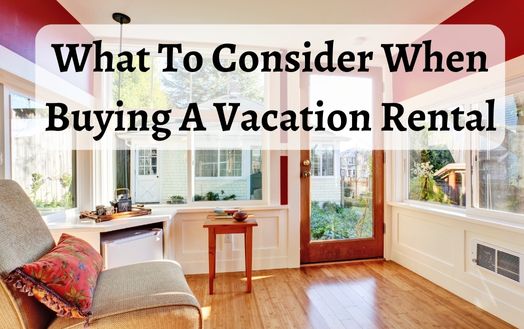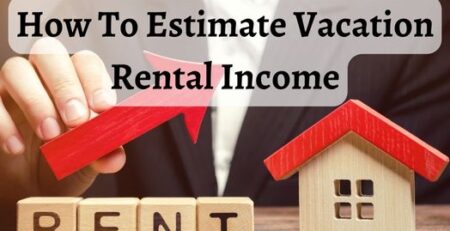What To Consider When Buying A Vacation Rental
Vacation rental purchases involve many factors. As someone who has always subconsciously wanted to innovate, I know that finding the perfect property requires thinking outside the box and considering all aspects of the investment. This article will help you decide what to consider when buying a vacation rental to satisfy your wanderlust and add value to your portfolio.
Location comes first. Choose a location that matches your guests’ expectations. Whether it’s a beachfront paradise or a serene mountain retreat, the right location will ensure a steady stream of rental demand and maximize your return on investment. Innovation means anticipating trends, not following them. Find emerging tourist and real estate hotspots.
Next, determine your budget and property type. Do you want a rustic cabin or a seaside villa? Maintenance and rental income vary by property type. Understanding your target market’s preferences lets you tailor your choices. Innovation requires risk-taking and discomfort. Explore unique property types that may appeal to niche markets or offer something different from traditional vacation rentals.
These factors, along with investment potential, long-term value, property management services, local attractions, and seasonal factors, can make buying a vacation rental a fun and profitable venture.
Let’s explore this ever-changing industry’s secrets to smart decision-making together!
What To Consider When Buying A Vacation Rental
Consider a vacation rental’s ROI before buying. Buying a vacation rental property lets you make money and relax.
Before diving in, consider several factors. First, decide if you want to manage the property yourself or hire a company. Self-management saves money on management fees but takes more time and effort.
Rental income is also important. Research the average rental rates in the area you plan to buy and estimate how many weeks or months you can rent out your property each year. This will estimate vacation rental income. This income must cover mortgage payments, maintenance, and property taxes.
When calculating ROI, don’t forget property taxes. Before buying, research property tax rates. If property taxes consume a large portion of your rental income, they can hurt profitability.
Consider hiring a property management company or managing it yourself when buying a vacation rental property to maximize ROI. Consider seasonal and local rental income. Finally, property taxes affect your profit. Consider these factors before buying a vacation rental property to make an informed decision.
Location
Vacation rental property location is crucial. Location can make or break your vacation rental. So, where should you consider buying? Here are three key factors to consider when it comes to location:
- Vacation Rental Demand: Look for areas with high demand for vacation rentals. This could be popular tourist destinations, cities with major attractions or events, or areas known for their natural beauty. By choosing a location with strong vacation rental demand, you increase your chances of having a steady stream of bookings throughout the year.
- Vacation Trends: Stay up-to-date on current vacation trends and target locations that align with these trends. For example, if eco-tourism is on the rise, look for properties in environmentally-friendly destinations. If wellness retreats are popular, consider areas known for their spas and wellness centers. By tapping into these trends, you can attract travelers who are seeking unique and innovative experiences.
- Property Types: Consider the different types of vacation rental properties available in the area you’re interested in. Are there condos, beach houses, cabins, or villas? Each property type attracts a different kind of guest and offers different amenities. Research what types of properties are most in-demand in that specific location to ensure you choose one that will cater to your target market.
Consider vacation rental demand, current vacation trends, and the area’s property types when choosing a vacation rental location. As a vacation rental owner, you’ll succeed by choosing a desirable location that matches these factors.
After discussing location, let’s talk about property type.
Property Type

Imagine walking into your dream vacation home—a cozy beachfront cottage with breathtaking views and crashing waves just steps away. Consider your target market’s needs when choosing a vacation rental property.
You want families, couples, or solo travelers. Accommodation preferences vary by group. Families may prefer a large house with multiple bedrooms and a backyard for their children to play in, while couples may prefer a romantic condo in a bustling city.
Choose between a standalone vacation home or a short-term rental property in a larger complex. Standalone homes offer privacy and flexibility but require more maintenance and property management. However, complex rentals often include shared amenities like pools, gyms, and tennis courts. These complexes also have property management services to handle guest bookings and maintenance requests.
Consider investment returns when choosing a vacation rental property. Will this be an investment or a vacation home? Consider location demand and occupancy rates to maximize profit. Find year-round attractions and events. Consider how much time and effort you’re willing to put into managing the property versus hiring vacation rental professionals.
When buying a vacation home, consider its investment potential. Before buying, consider location desirability and market trends to ensure your investment will be financially and personally rewarding.
Investment Potential
Owning a vacation rental property offers incredible investment potential. Vacation rentals offer multiple income streams and long-term financial gains, making them smart real estate investments. Before diving into this exciting venture, there are some important factors to consider.
First, assess your vacation rental’s location. Find vacation rental hotspots with beaches, tourist attractions, and outdoor activities. A prime location guarantees guests and maximizes rental income. To avoid legal issues, check local short-term rental regulations.
Second, assess vacation rental property costs. Property maintenance, insurance, utilities, and marketing fees are in addition to the purchase price. To assess the investment’s long-term viability, calculate these costs. If you hire a property manager, you must include management fees.
Evaluate your vacation rental’s ROI. Compare average nightly rates to projected operating costs. Analyze the occupancy and rental income of nearby properties. This data will estimate your vacation rental investment’s long-term income.
Strategically buying a vacation rental can yield great returns. Assess high-demand short-term rental locations with appealing amenities and local regulations. Analyze all costs, including ongoing expenses, and calculate market research-based ROI. Consider these factors before buying your dream vacation home-turned-investment property to succeed in this lucrative industry.
Rental Demand

Assessing the popularity of short-term rentals in a desired location can provide valuable insight into the potential success of your investment property. When considering rental demand for vacation rental properties, it’s important to keep these factors in mind:
- Location is key: The popularity of a destination plays a significant role in rental demand. Look for areas that attract tourists year-round or have a high influx of visitors during peak seasons. Coastal towns, ski resorts, and popular cities are often great options.
- Research local regulations: Before investing in a vacation rental property, make sure to familiarize yourself with any local regulations or restrictions on short-term rentals. Some cities may have limitations on the number of days you can rent out your property or require specific permits.
- Analyze competition: Take a look at other vacation rental listings in your desired location to gauge the level of competition. Pay attention to factors such as pricing, amenities offered, and overall customer reviews. This will give you an idea of what you’re up against and help you position your own property competitively.
- Seek professional advice: Consider consulting with a vacation rental management company or real estate agent who specializes in this market segment. They can provide valuable insights into current market trends and help you make informed decisions about investing in vacation rentals.
Considering rental demand and these factors when buying a vacation rental property increases your chances of success.
Management Options
To maximize profits and guest satisfaction, there are many vacation rental property management options. Hire a property manager or company. These experts can advertise, screen, and book vacation rental properties. You can focus on other things while they maintain and earn from your vacation rental home.
Property managers and management companies offer many benefits. First, they can market your vacation rental home to a large pool of renters. They know how to make appealing listings that maximize occupancy. They also handle all guest inquiries, reservations, and issues during their stay. This ensures a smooth owner-guest experience.
Vacation rental property managers or management companies can also handle daily operations. This includes cleaning between guests, maintenance repairs, restocking supplies, and local compliance. They also manage guest payments and rental property finances.
For hassle-free, profitable vacation rental property management, hire a property manager or management company. Their marketing, guest communication, maintenance, and financial management skills can help you succeed in vacation rentals.
Financial Considerations

As you plan the finances of a profitable vacation retreat, imagine standing on a beautiful beach with warm sand beneath your toes.
Before buying a vacation rental property, consider the financial implications. Finance vacation rentals. Investment property loans have different terms than traditional mortgages. Research vacation rental lenders. Mortgage interest and property taxes must be factored into vacation rental finances. These costs can hurt profits. Know the costs and include them in your budget. Property taxes may rise over time, affecting cash flow.
Consider whether you’ll manage the property yourself or hire a professional. Self-management may save money, but it takes more time and effort. However, hiring a management company can be convenient, but it costs more, so financial feasibility must be considered. These financial considerations will help you make a smart vacation rental investment.
As we discuss property maintenance next, remember that maintaining your investment is just as important as making it financially sound.
Property Maintenance
Maintenance is crucial when renting out a vacation home for more than a few days. Vacation rental owners must maintain their properties beyond cleaning and repairs. To keep guests comfortable, it needs regular maintenance.
To maintain your vacation rental property effectively, here are some key aspects to keep in mind:
- Regular cleaning: Keeping your vacation rental clean is crucial for guest satisfaction. Hiring a cleaning service between bookings ensures that the property is fresh and tidy for each new set of guests.
- Maintenance schedule: Create a maintenance schedule to address any repairs or updates needed in the property. This can include checking appliances, plumbing, electrical systems, as well as inspecting the overall condition of furniture and fixtures.
- Landscaping: The exterior appearance of your vacation rental can greatly impact its desirability. Maintaining an attractive landscape adds curb appeal and entices potential renters.
- Emergency preparedness: Prepare for unforeseen circumstances by having emergency contacts readily available for guests. Additionally, consider investing in insurance coverage specifically tailored for vacation rentals to protect against potential damages or liabilities.
By focusing on these property maintenance tasks, you can keep your vacation rental in great shape and give your guests a great experience.
After discussing vacation rental property maintenance, let’s discuss rental regulations.
Rental Regulations

Know your property’s rental rules to comply with local laws. Before deciding, know what to consider when buying a vacation rental and research local rental laws. Understanding these rules will help you stay legal and give your guests a good time.
Consider rental laws when buying a vacation rental. Some areas have strict vacation rental rules. They may limit the number of days you can rent your property or require licensing and permits. Understanding these regulations upfront can help you avoid costly fines or legal issues.
Knowing rental regulations helps you set guest expectations. Knowing what’s allowed and what’s not helps you list any restrictions or limitations. Transparency attracts responsible renters who respect your property.
Before buying a vacation home, research rental laws. Thus, you can satisfy guests and comply with local laws. After covering this important aspect of vacation rental ownership, let’s talk about insurance and why it’s important to protect your investment.
Insurance Coverage
Insurance protects your investment and gives you peace of mind. Vacation rental owners must protect themselves from risks and liabilities. Two vacation rental insurance considerations:
- Property Coverage: As a buyer of vacation rental properties, it’s important to ensure that your insurance policy covers the structure itself. This includes protection against fire, theft, vandalism, and natural disasters. Additionally, consider adding coverage for any personal property you provide for guests’ use, such as furniture or appliances.
- Liability Coverage: Owning a vacation rental comes with inherent risks. Guests may accidentally damage your property or injure themselves during their stay. Liability coverage protects you in these situations by covering legal expenses and medical bills if someone files a lawsuit against you. It’s essential to have adequate liability limits to protect your assets in case of an unfortunate event.
Many lenders require proof of adequate insurance coverage before approving vacation rental financing. Thus, choosing the right insurance policy protects your investment and ensures smooth transactions during the buying process.
Buying a vacation rental requires comprehensive vacation rental insurance. Doing so reduces risks and gives you peace of mind that unexpected events won’t harm your investment or finances.
After discussing vacation rental property insurance, let’s move on to market analysis.
Market Analysis

Analyze the market to make informed investment property decisions. Vacation rentals require market analysis.
Market trends can help you determine the best vacation rental locations and demand. Vacation rental data should show high occupancy, positive cash flow, and growth potential. This will help you invest wisely and maximize returns.
Market analysis should consider tourist attractions, amenities, and local vacation rental regulations. Find the most popular vacation rental destinations year-round or seasonally. To ensure demand for your property, find areas with a steady flow of visitors and a limited supply of accommodations. To set competitive vacation rental rates, study market pricing trends. Pricing should attract guests and maximize profits. Compare the rates and amenities of nearby properties. This data will help you price your property competitively and determine guest expectations.
Before buying a vacation rental property, do a market analysis to ensure its long-term value. Understanding market trends will help you make decisions that match demand and growth potential. With this knowledge, you can confidently move on to the long-term value section without taking unnecessary steps or investing.
Long-Term Value
Long-term value is important when investing in vacation rental properties. Owning a vacation home can provide a place to escape and rental income, but it’s important to consider the long-term value of this investment.
If chosen wisely, a vacation rental property can be an asset. Location, market demand, and growth potential are crucial when assessing a purchase’s long-term value. Is it touristy? Are there year-round attractions nearby? Consider these before buying.
Consider local changes that may affect your investment’s value. A new resort or major infrastructure project can boost vacation rental demand, increasing occupancy rates and rental income. If the market is declining or oversaturated, you may want to reconsider.
Maintaining a vacation rental property requires ongoing costs. While short-term gains may be tempting, it’s important to understand what it takes to maintain and manage this type of investment over time. Maintaining guest satisfaction and value requires budgeting for regular repairs and upgrades. These factors will help you decide whether to invest in a vacation rental property that fits your long-term goals.
Next, property management services can streamline operations and maximize your return on investment without adding stress.
Property Management Services

Hiring a property management company can boost your ROI and reduce the stress of vacation rental ownership. Property management services handle the daily operations of your vacation rental, so you can focus on other things or invest in more properties. These services may include marketing and advertising your property on vacation rental platforms, handling guest inquiries and bookings, coordinating key exchanges and check-ins, managing cleaning and maintenance schedules, and even handling guest complaints.
Professional rental management gives you industry expertise. They understand market trends, pricing strategies, and effective marketing to boost occupancy and revenue. They’ll help you set competitive rental rates and adapt to market changes. Property management companies use advanced booking software to synchronize calendars across multiple platforms, ensuring accurate availability information for potential guests.
Vacation rental owners can rest easy with a property management company. Busy people may struggle to handle guest inquiries, cleanings, repairs, and 24/7 availability. By outsourcing these tasks to experts, you’ll save time and ensure your property is well-maintained.
Vacation rental property buyers must consider property management. It maximizes ROI and reduces property ownership stress.
Local Attractions
Explore the rich culture and breathtaking sights near your vacation rental property. Consider the proximity of popular tourist destinations when choosing a local vacation rental.
Famous landmarks and museums can improve your guests’ vacation rental experience and boost demand. Easy access to local attractions lets guests fully enjoy their surroundings and make lasting memories.
Choose a vacation rental near historical sites to explore. Ancient ruins and famous landmarks attract visitors to historical destinations. By making these historical sites easily accessible, you can make your vacation rental stand out and attract tourists seeking a cultural experience.
Embrace natural wonders: Another important factor when choosing a vacation rental is its proximity to national parks or beautiful beaches. Hiking, swimming, and sunbathing are popular activities for travelers. Vacation rentals with local attractions are more desirable.
Indulge in culinary delights: Offering a variety of nearby dining options helps create an exceptional guest experience. Make sure there are good restaurants, cafes, and food markets near your vacation rental property so guests can enjoy delicious food without traveling. Highlighting local gastronomic experiences delights guests and immerses them in the local culture, increasing your property’s value.
Consider nearby vacation rental attractions when buying a vacation rental property. Expanding on this allure will attract potential guests who want unique travel experiences that can be fulfilled by visiting vibrant local attractions.
Moving on, seasonal factors may affect your vacation rental property’s demand.
Seasonal Factors

Consider how seasonality affects vacation rental demand. Consider seasonality when buying a vacation rental. Seasonal factors affect how often people rent vacation homes.
Vacation rentals are popular during the summer and holiday seasons. Many families and individuals want a place to unwind. If you buy a property in a tourist destination with appealing seasonal activities, you can expect higher occupancy rates and rental income during these times.
Off-peak vacation rental demand may drop. If you buy a beachfront property where swimming is only possible in certain months, you may have lower occupancy rates in the winter. It’s important to consider whether your property has any unique features or attractions that can attract visitors even during slower periods.
Local events and festivals are also important. These events can significantly impact tourism patterns and seasonal vacation rental demand. Events can help you predict demand spikes or lulls that could affect your rental income.
When buying a vacation rental property, consider these seasonal factors to assess its year-round profitability. Knowing when visitors are most likely will help you optimize pricing, marketing, and maintenance. You’ll maximize guest satisfaction and vacation rental property ROI by accommodating seasonal fluctuations.
Final Thoughts
Finally, buying a vacation rental involves many factors. Know what to consider when buying a vacation rental before giving it a try. First, your rental’s location will determine its appeal to guests. Vacation rental success also depends on the property type. Make sure your target audience likes your cabin in the woods or beachfront villa. To make sure your vacation rental makes money, evaluate the area’s investment potential and rental demand. Long-term value and property appreciation are also important. Consult experts or conduct market research to make an informed decision.
Finally, assess local property management. Maintaining and interacting with guests through reliable professionals saves time and stress. Consider local attractions and amenities to improve guests’ experiences and increase bookings. Finally, plan for seasonal demand changes.
If done right, buying a vacation rental is fun. These key factors can help you find a profitable investment opportunity that brings you and your guests joy for years to come.
Frequently Asked Questions
Are There Any Specific Tax Implications Or Regulations To Consider When Buying A Vacation Rental?
Vacation rentals have tax implications and regulations. Be aware of property taxes, income taxes on rental income, and local occupancy taxes. There may also be restrictions on how often you can rent your property or what insurance you need. It’s important to research and consult with vacation rental experts because these factors vary by location.
As a vacation rental owner, you can avoid problems by understanding these tax implications and regulations.
What Are The Typical Occupancy Rates For Vacation Rentals In This Area?
Location, seasonality, and local attractions affect vacation rental occupancy rates. However, online booking platforms and the desire for unique travel experiences have steadily increased demand for vacation rentals. I’ve found that many vacation rental owners have high year-round occupancy. Travelers prefer alternatives to hotels for more space, privacy, and amenities.
Owners can also increase occupancy by using technology and marketing effectively. If you’re considering buying a vacation rental in this area, you can expect high occupancy rates with the right approach.
What Are The Potential Risks Or Challenges Of Owning A Vacation Rental?
Vacation rentals can be fun, but they come with risks and challenges. Unpredictable occupancy rates and seasonal demand are major risks. Researching local occupancy rates can help, but keep in mind that economic conditions and competition from other rentals can change these numbers.
Remote property management, especially if you don’t live nearby, is another challenge. This requires reliable local cleaning, maintenance, and repair services.
Unexpected expenses like property damage or guest legal issues may arise. Staying proactive and using strategies like effective marketing and guest screening can reduce these challenges. If one tackles these risks creatively, vacation rental ownership can be lucrative and fun.
Are There Any Restrictions Or Limitations On Renting Out The Property, Such As Maximum Occupancy Or Minimum Stay Requirements?
Vacation rentals have restrictions. Local laws determine these restrictions. Maximum occupancy limits, which limit the number of guests, are common. Minimum stay requirements may also apply.
Before buying a vacation rental, research and understand these restrictions, as they can affect rental income and guest attraction. With proper planning and innovative strategies like offering unique experiences or targeting niche markets, you can overcome these limitations and make your vacation rental a successful investment.
How Can I Ensure The Safety And Security Of My Guests And Property While Renting Out A Vacation Rental?
I take several innovative steps to protect my guests and property while renting out a vacation rental.
First, I buy high-quality alarms, smart locks, and surveillance cameras. These give me peace of mind and enable remote property monitoring. I also screen guests with background checks and ID verification. So only trustworthy people stay at my rental. I give guests clear emergency instructions and emergency contact information to increase their safety. I protect my guests and property by being proactive and using new methods.











